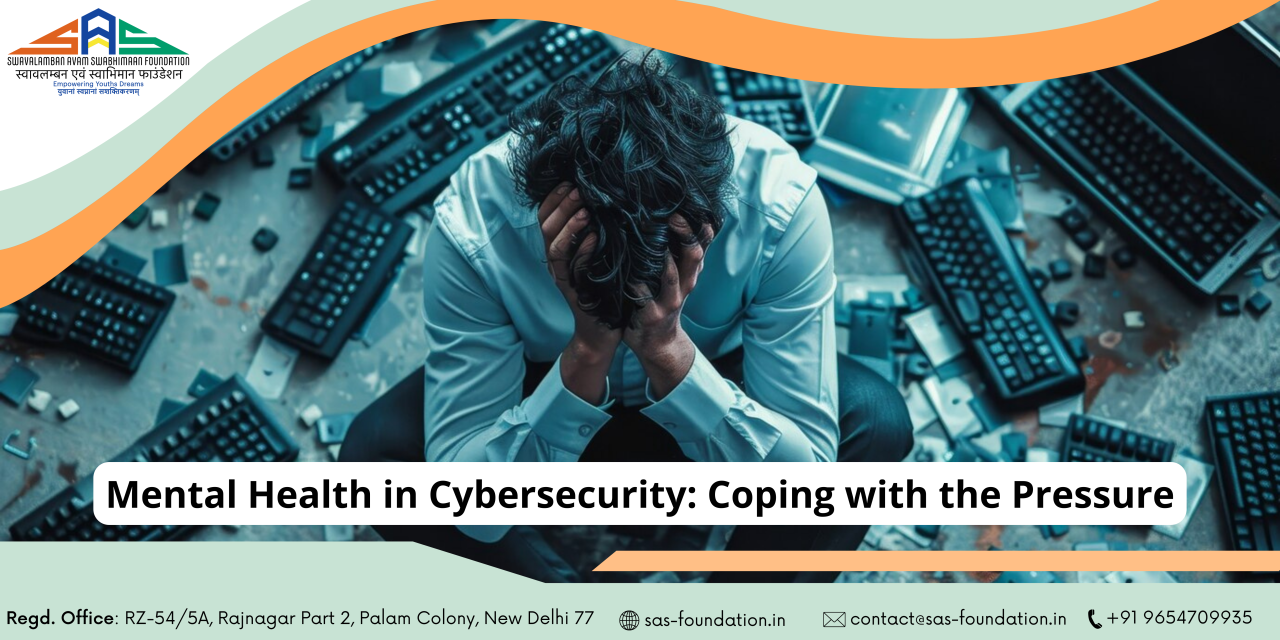Cybersecurity Under Pressure: Prioritizing Mental Health for Digital Defenders
In today’s hyper-connected digital landscape, cybersecurity has become one of the most critical functions for governments, businesses, and individuals alike. Every day, cybersecurity professionals work behind the scenes, safeguarding sensitive data, thwarting cyberattacks, and responding to threats that evolve at lightning speed. They are our silent sentinels, ensuring the safety of our digital lives.
But while these professionals are equipped to tackle external threats, they often face internal battles that remain unspoken—chronic stress, fatigue, and emotional exhaustion. The psychological toll of constantly defending against invisible attackers, working under pressure, and dealing with high-stakes consequences is immense. Mental health in cybersecurity is an urgent yet often overlooked issue, and it’s time we shine a light on it.
The High-Stress World of Cybersecurity
Cybersecurity isn’t your typical 9-to-5 job. It’s a high-intensity career that requires constant vigilance. Threats don’t follow office hours, and cybercriminals exploit vulnerabilities any time of the day. This means that many cybersecurity professionals work irregular shifts, stay on-call during weekends, or even pull all-nighters to respond to incidents like data breaches or ransomware attacks.
Add to that the immense responsibility placed on their shoulders—protecting systems from catastrophic attacks that could cost companies millions or jeopardize national security—and it becomes clear why burnout is common in this field.
According to recent industry surveys, nearly 51% of cybersecurity professionals have experienced burnout, and almost 60% report that stress levels are increasing. This level of chronic stress can result in decreased productivity, impaired judgment, fatigue, and in severe cases, depression or anxiety disorders.
Key Stressors in the Cybersecurity Field
Understanding what leads to mental strain in cybersecurity can help organizations and leaders take meaningful action. Some of the most common causes include:
- Constant Pressure and Hypervigilance:
Cybersecurity professionals are expected to detect, assess, and mitigate risks before they become threats. This continuous vigilance can be mentally exhausting, leading to hyper-alertness and difficulty relaxing, even off-duty. - Lack of Resources and Staffing Shortages:
Many security teams are understaffed. Professionals are often expected to do more with less, leading to long hours and a never-ending to-do list. The skills gap in cybersecurity only adds to this pressure. - High Stakes and Fear of Failure:
A single oversight or missed vulnerability can result in a major data breach or attack. This fear of making a mistake—especially when the consequences are enormous—adds a tremendous psychological burden. - Isolation and Stigma:
Cybersecurity roles can be isolating. Some professionals work alone or with limited team interactions. Additionally, mental health stigma still exists in many workplaces, making it difficult to openly express feelings of stress or burnout. - Information Overload:
The sheer volume of alerts, updates, and intelligence that cybersecurity professionals must track daily contributes to cognitive overload, further taxing their mental capacity.
Recognizing the Signs of Burnout
Burnout doesn’t happen overnight—it builds gradually. Cybersecurity professionals, as well as their leaders, should stay alert to these signs:
- Chronic fatigue and insomnia
- Reduced concentration and productivity
- Feeling cynical or detached from work
- Headaches, gastrointestinal problems, or other stress-related health issues
- Decreased job satisfaction or a desire to leave the profession
Early intervention is key to preventing long-term damage to both individual health and organizational performance.
Strategies for Mental Well-Being
Organizations and professionals alike must proactively address mental health in cybersecurity. Here are practical steps and strategies:
1. Promote a Culture of Openness
Create an environment where employees feel safe discussing mental health without fear of judgment or consequences. Normalize check-ins that include emotional well-being alongside work updates.
2. Ensure Reasonable Workloads
Avoid overburdening staff. Leaders should regularly evaluate workloads and adjust assignments to ensure teams are not overwhelmed.
3. Encourage Breaks and Downtime
Prevent burnout by encouraging regular breaks, paid time off, and disconnecting after hours. Implement policies that allow for digital detoxes, especially after major incident responses.
4. Provide Mental Health Resources
Offer access to mental health services, including counseling, employee assistance programs (EAPs), and wellness workshops. Training staff in mental health first aid can also be a valuable step.
5. Invest in Tools and Automation
Leverage AI and automation tools to reduce the manual burden on security teams. Automated incident response, monitoring, and alert filtering can help reduce workload and stress.
6. Foster Peer Support
Promote mentoring, team collaboration, and informal peer support networks. Talking to someone who understands the pressure can be incredibly validating and helpful.
7. Train Leaders to Recognize Warning Signs
Managers and team leads must be trained to spot mental health red flags and respond appropriately. Compassionate leadership is essential in reducing burnout.
The Role of Leadership in Driving Change
Leaders in cybersecurity are in a unique position to make meaningful changes. By actively prioritizing mental well-being, they set a powerful example. This includes advocating for fair policies, providing sufficient resources, and fostering team environments rooted in empathy.
Forward-thinking organizations understand that protecting their digital assets also means protecting the people who safeguard them. They recognize that strong cybersecurity depends not just on firewalls and encryption—but also on healthy, motivated, and mentally resilient teams.
Looking Ahead: Building a Culture of Resilience
The future of cybersecurity depends not only on advancing technologies but also on how well we care for our human assets. As cyber threats grow more sophisticated, we must ensure our defenders are equally equipped—emotionally and psychologically.
Resilience can be cultivated. Through mental health training, peer engagement, and system-wide support, we can build teams that not only withstand pressure but thrive in it. It’s about shifting from a survival mindset to one of sustainability.
Conclusion: Defending the Defenders
The digital world is expanding, and so are the demands on cybersecurity professionals. While their roles are critical in defending data and infrastructure, they also need defending—from stress, burnout, and mental fatigue.
It’s time to start conversations, invest in mental health resources, and place emotional well-being at the heart of cybersecurity strategies. Whether you’re a professional in the field, a leader, or an organization looking to improve, remember: a secure system starts with a secure mind.
Let’s stand together to protect our digital defenders. 💻🧠✨
Subscribe to “YouthSecure 4.0” for more expert insights and actionable resources on cybersecurity, youth empowerment, and mental wellness.
🔗 Subscribe on LinkedIn










